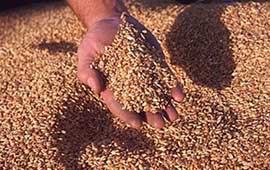Brewer grains are brewery waste, which is the thick residue left after the barley wort has been boiled and sucked off.
Despite the previous mechanical treatments, useful substances still remain in the grain, for example, particles of kernels and grain shells, which can be used for further sale. Most often, this waste goes to animal feed, both fresh and dried. In addition, sulphite-alcohol stillage and biogas are obtained from the grains. By the way, grains are similar in properties to barley, but at the same time they are much cheaper in cost, which makes this product attractive for farms. The composition of this feed is as follows: 100 kilograms of this substance contains 21.2 feed units and 4.2 kg of digestible protein, therefore these wastes are considered the most suitable for rapid weight gain by animals. As a rule, this substance is fed to cows, oxen or pigs, but in recent years, given the growing demand for biofuels, brewer’s grains are increasingly processed into biogas. In addition, grains are often added to bran bread dough, but this technology is mainly used in EU countries.
What is needed for the supply of beer grains to the EU
The EU countries are mainly interested in the import of brewer’s grains, where all the necessary modern capacities are available for its further processing. At the same time, in Europe itself, the price for grains is low, since a lot of this substance is produced in those countries that are engaged in the production of beer. In particular, we are talking about Germany and Poland. However, other countries, such as Spain, Latvia, Lithuania and Estonia, are also interested in importing this substance. The price for this substance varies from the type of grain – for dry grain you can get up to $ 142 per ton, but for the usual one – only $ 0.16 per ton. Wet grains sell for $ 28 per ton. Wholesale supplies assume that the manufacturer must also pay VAT – in the EU this is VAT, it is 20%. The use of this product is not limited exclusively to livestock enterprises, and therefore the grain can also be offered to factories that produce biogas and bake bread.
For wholesale, the manufacturer must prepare the constituent papers of the exporting organization, foreign economic agreements, transaction passports, invoices and waybills, which indicate the weight and quantity of products, as well as transport documents with a quality certificate. It is better to prepare these documents through intermediaries so that the papers are drawn up in accordance with the requirements of the EU countries.
Features of the import of brewer grains
An important point should be taken into account in bulk deliveries of grains: with a large amount of this substance, an overstocking of grains may occur, and then this substance will be more difficult to sell. This happens especially often in years when cereals give a good harvest. In this case, it would be more logical for the supplier to offer grains not to factories related to the production of beer, but to choose local farmers or factories specializing in the production of biogas.






